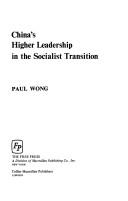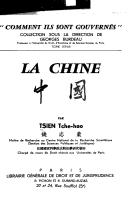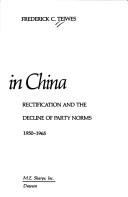| Listing 1 - 9 of 9 |
Sort by
|
Book
ISBN: 023103900X Year: 1975 Publisher: New York (N.Y.): Columbia university press
Abstract | Keywords | Export | Availability | Bookmark
 Loading...
Loading...Choose an application
- Reference Manager
- EndNote
- RefWorks (Direct export to RefWorks)
China --- Chine --- Politics and government --- Politique et gouvernement --- S06/0421 --- S06/1040 --- #SML: Joseph Spae --- China: Politics and government--CCP: 1949 - 1966 --- China: Politics and government--Socialist Education Movement (1962-65) --- -China --- -S06/0421

ISBN: 0029356008 Year: 1976 Publisher: New York (N.Y.): Free Press
Abstract | Keywords | Export | Availability | Bookmark
 Loading...
Loading...Choose an application
- Reference Manager
- EndNote
- RefWorks (Direct export to RefWorks)
Elite (Social sciences) --- Elite (Sciences sociales) --- China --- Chine --- Politics and government --- Politique et gouvernement --- S06/0421 --- S11/0708 --- -#SML: Joseph Spae --- China: Politics and government--CCP: 1949 - 1966 --- China: Social sciences--Elite --- -Elite (Social sciences) --- Elite (Social sciences). --- -S06/0421 --- -Elite (Social sciences). --- #SML: Joseph Spae
Book
ISBN: 9783110531046 Year: 2018 Publisher: Berlin Walter de Gruyter GmbH
Abstract | Keywords | Export | Availability | Bookmark
 Loading...
Loading...Choose an application
- Reference Manager
- EndNote
- RefWorks (Direct export to RefWorks)
The relationship between politics and law in the early People’s Republic of China was highly contentious. Periods of intentionally excessive campaign justice intersected with attempts to carve out professional standards of adjudication and to offer retroactive justice for those deemed to have been unjustly persecuted. How were victims and perpetrators defined and dealt with during different stages of the Maoist era and beyond ? How was law practiced, understood, and contested in local contexts ? This volume adopts a case study approach to shedlight on these complex questions. By way of a close reading of original case files from the grassroots level, the contributors detail procedures and question long-held assumptions, not least about the Cultural Revolution as a period of “lawlessness.”
Law --- History --- Cases. --- China --- Politics and government --- Acts, Legislative --- Enactments, Legislative --- Laws (Statutes) --- Legislative acts --- Legislative enactments --- Jurisprudence --- Legislation --- S06/0421 --- S06/0422 --- S08/0350 --- China: Politics and government--CCP: 1949 - 1966 --- China: Politics and government--CCP: 1966 - 1976 --- China: Law and legislation--General works and codices: since 1949
Book
Abstract | Keywords | Export | Availability | Bookmark
 Loading...
Loading...Choose an application
- Reference Manager
- EndNote
- RefWorks (Direct export to RefWorks)
Parti communiste chinois --- History --- Histoire --- S06/0405 --- S06/0410 --- S06/0420 --- S06/0421 --- S06/0422 --- S06/0423 --- China: Politics and government--CCP, history and ideology: general --- China: Politics and government--CCP: 1921 - 1949 (Here also relations with Russian CP in that period) --- China: Politics and government--CCP: since 1949 (Here also general policy and ideology in that period) --- China: Politics and government--CCP: 1949 - 1966 --- China: Politics and government--CCP: 1966 - 1976 --- China: Politics and government--CCP: 1976 - 1989 --- Zhongguo gong chan dang --- History.

ISBN: 2275012664 Year: 1976 Volume: 28 Publisher: Paris Librairie générale de droit et de jurisprudence
Abstract | Keywords | Export | Availability | Bookmark
 Loading...
Loading...Choose an application
- Reference Manager
- EndNote
- RefWorks (Direct export to RefWorks)
Public law. Constitutional law --- China --- Chine --- Politics and government --- Politique et gouvernement --- S06/0220 --- S06/0421 --- S06/0422 --- China: Politics and government--People's Republic: general --- China: Politics and government--CCP: 1949 - 1966 --- China: Politics and government--CCP: 1966 - 1976 --- -Politics and government --- -S06/0220 --- S06/0210 --- S06/0420 --- S07/0370 --- S07/0400 --- S10/0240 --- S14/0200 --- #SML: Joseph Spae --- #SML: Dries Van Coillie --- 321 (51) --- China: Politics and government--Republic: 1911 - 1949 --- China: Politics and government--CCP: since 1949 (Here also general policy and ideology in that period) --- China: Army and police force--Military institutions --- China: Army and police force--Police --- China: Economics, industry and commerce--General works and economic history: since 1949 --- China: Education--General works --- Politieke organisatie. Staten als politieke machten. Regeringsvormen--China --- 321 (51) Politieke organisatie. Staten als politieke machten. Regeringsvormen--China --- -Public law. Constitutional law --- -China

ISBN: 0873325907 0873327098 Year: 1990 Publisher: Armonk Sharpe
Abstract | Keywords | Export | Availability | Bookmark
 Loading...
Loading...Choose an application
- Reference Manager
- EndNote
- RefWorks (Direct export to RefWorks)
Kao, Kang --- Chung-kuo kung chijan tang --- Purges --- Chung-kuo kung ch'an tang --- China --- Chine --- Politics and government --- Politique et gouvernement --- S06/0421 --- China: Politics and government--CCP: 1949 - 1966 --- Gao, Gang. --- Zhongguo gong chan dang --- Purges. --- 高剛 --- Zhong guo gong chan dang --- Chung-kuo kung chʻan tang --- Chūgoku Kyōsantō --- Chungguk Kongsandang --- 中国共产党 --- 中國共產黨 --- КПК --- KPK --- Komunistická strana Číny --- Komunistička partija Kine --- Communist Party of China --- Chinese Communist Party --- Communist Party (China) --- Gong chan dang (China) --- 共产党 (China) --- Коммунистическая партия Китая --- Kommunisticheskai︠a︡ partii︠a︡ Kitai︠a︡ --- Shina Kyōsantō --- Китайска комунистическа партия --- Kitaĭska komunisticheska partii︠a︡ --- Partido Comunista de China --- PCCh --- Parti communiste chinois --- CCP --- Partito comunista cinese --- KPCh --- Kommunistische Partei Chinas --- К.П.К. --- K.P.K. --- CPC --- C.C.P. --- Partia Komuniste të Kinës --- Đảng cộng sản Trung quốc --- Zhong gong --- 中共 --- Pcc --- P.C. Chino --- ХКН --- KhKN --- Хятадын Коммунист нам --- Khi︠a︡tadyn Kommunist nam
Book
ISBN: 0674094751 067409476X 9780674094758 9780674094765 Year: 1980 Volume: 41 Publisher: Cambridge (Mass.): Harvard university press
Abstract | Keywords | Export | Availability | Bookmark
 Loading...
Loading...Choose an application
- Reference Manager
- EndNote
- RefWorks (Direct export to RefWorks)
S06/0222 --- S06/0421 --- S06/0422 --- S11/0470 --- #SML: Joseph Spae --- China: Politics and government--People's Republic: local and provincial government --- China: Politics and government--CCP: 1949 - 1966 --- China: Politics and government--CCP: 1966 - 1976 --- China: Social sciences--Cities: since 1949 --- Canton (China) --- Guangzhou Shi (China) --- Guangzhou (China) --- Communism --- Local government --- History --- Politics and government --- Yang-chʻeng (Guangdong Sheng, China) --- Kanton (China) --- Wu-yang chʻeng (China) --- Hui-chʻeng (China) --- Kuang-chou (Guangdong Sheng, China) --- Kwangchow (China) --- Kwangju (China) --- Guang zhou (China) --- Kouang-chou (China) --- Quảng Châu (China) --- Shengcheng (China) --- Puyün (China) --- Pʼan-yü (Guangzgou Shi, China) --- Kwang-chowfu (China) --- Fan-yü (China) --- Kuang-chou-shih (China) --- Guangzhoushi (China) --- 广州 (China) --- Communism - China - History - 20th century --- Local government - China - Case studies --- Guangzhou (China) - Politics and government --- Guangzhou Shi (China) - History --- Guangzhou Shi (China) - Politics and government

ISBN: 0873321324 0712909338 Year: 1979 Publisher: Dawson Sharpe
Abstract | Keywords | Export | Availability | Bookmark
 Loading...
Loading...Choose an application
- Reference Manager
- EndNote
- RefWorks (Direct export to RefWorks)
Chung-kuo kung chijan tang --- Purges --- China --- Chine --- Politics and government --- Politique et gouvernement --- S06/0421 --- S06/0434 --- S06/1000 --- #SML: Joseph Spae --- China: Politics and government--CCP: 1949 - 1966 --- China: Politics and government--Works and campaigns (against deviations) --- China: Politics and government--Political campaigns --- Zhongguo gong chan dang --- -Zhong guo gong chan dang --- Chung-kuo kung chʻan tang --- Chūgoku Kyōsantō --- Chungguk Kongsandang --- 中国共产党 --- 中國共產黨 --- КПК --- KPK --- Komunistická strana Číny --- Komunistička partija Kine --- Communist Party of China --- Chinese Communist Party --- Communist Party (China) --- Gong chan dang (China) --- 共产党 (China) --- Коммунистическая партия Китая --- Kommunisticheskai︠a︡ partii︠a︡ Kitai︠a︡ --- Shina Kyōsantō --- Китайска комунистическа партия --- Kitaĭska komunisticheska partii︠a︡ --- Partido Comunista de China --- PCCh --- Parti communiste chinois --- CCP --- Partito comunista cinese --- KPCh --- Kommunistische Partei Chinas --- К.П.К. --- K.P.K. --- CPC --- C.C.P. --- Partia Komuniste të Kinës --- Đảng cộng sản Trung quốc --- Zhong gong --- 中共 --- Pcc --- P.C. Chino --- ХКН --- KhKN --- Хятадын Коммунист нам --- Khi︠a︡tadyn Kommunist nam --- -S06/0421 --- -Purges --- -Chung-kuo kung chijan tang --- Cina --- Kinë --- Cathay --- Chinese National Government --- Chung-kuo kuo min cheng fu --- Republic of China (1912-1949) --- Kuo min cheng fu (China : 1912-1949) --- Chung-hua min kuo (1912-1949) --- Kina (China) --- National Government (1912-1949) --- China (Republic : 1912-1949) --- People's Republic of China --- Chinese People's Republic --- Chung-hua jen min kung ho kuo --- Central People's Government of Communist China --- Chung yang jen min cheng fu --- Chung-hua chung yang jen min kung ho kuo --- Central Government of the People's Republic of China --- Zhonghua Renmin Gongheguo --- Zhong hua ren min gong he guo --- Kitaĭskai︠a︡ Narodnai︠a︡ Respublika --- Činská lidová republika --- RRT --- Republik Rakjat Tiongkok --- KNR --- Kytaĭsʹka Narodna Respublika --- Jumhūriyat al-Ṣīn al-Shaʻbīyah --- RRC --- Kitaĭ --- Kínai Népköztársaság --- Chūka Jinmin Kyōwakoku --- Erets Sin --- Sin --- Sāthāranarat Prachāchon Čhīn --- P.R. China --- PR China --- Chung-kuo --- Zhongguo --- Zhonghuaminguo (1912-1949) --- Zhong guo --- République Populaire de Chine --- República Popular China --- Catay --- VR China --- VRChina --- 中國 --- 中国 --- 中华人民共和国 --- Jhongguó --- Bu̇gu̇de Nayiramdaxu Dundadu Arad Ulus --- Bu̇gu̇de Nayiramdaqu Dumdadu Arad Ulus --- Bu̇gd Naĭramdakh Dundad Ard Uls --- Khi︠a︡tad --- Kitad --- Dumdadu Ulus --- Dumdad Uls --- Думдад Улс --- Kitajska --- Zhong guo gong chan dang --- Purges.
Book
ISBN: 0691609160 0691008760 1400860571 0691055467 Year: 1989 Publisher: Princeton (N.J.): Princeton university press
Abstract | Keywords | Export | Availability | Bookmark
 Loading...
Loading...Choose an application
- Reference Manager
- EndNote
- RefWorks (Direct export to RefWorks)
The tumult of the Cultural Revolution after 1966 is often blamed on a few leaders in Beijing, or on long-term egalitarian ideals, or on communist or Chinese political cultures. Lynn White shows, however, that the chaos resulted mainly from reactions by masses of individuals and small groups to three specific policies of administrative manipulation: labeling groups, designating bosses, and legitimating violence in political campaigns. These habits of local organization were common after 1949 and gave the state success in short-term revolutionary aims, despite scarce resources and staff--but they also drove millions to attack each other later.First, measures accumulated before 1966 to give people bad or good names (such as "rightist" or "worker"); these set a family's access to employment, education, residence, and rations--so they gave interests to potential conflict groups. Second, policies for bossism went far beyond Confucian patronage patterns, making work units tightly dependent on Party monitors--so rational individuals either pandered to local bosses or (when they could) deposed them. Third, the institutionalized violence of political campaigns both mobilized activists and scared others into compliance. These organizational measures were often effective in the short run before 1966 but accumulated social costs that China paid later. The book ends with comparisons to past cases of mass urban ostracism in other countries, and it suggests how such tragedies may be forecast or prevented in the future.Originally published in 1989.The Princeton Legacy Library uses the latest print-on-demand technology to again make available previously out-of-print books from the distinguished backlist of Princeton University Press. These editions preserve the original texts of these important books while presenting them in durable paperback and hardcover editions. The goal of the Princeton Legacy Library is to vastly increase access to the rich scholarly heritage found in the thousands of books published by Princeton University Press since its founding in 1905.
S06/1050 --- S06/0421 --- S06/0425 --- S06/1040 --- China: Politics and government--The First Years of the Cultural Revolution (1966-69) --- China: Politics and government--CCP: 1949 - 1966 --- China: Politics and government--Organization and structure of the CCP --- China: Politics and government--Socialist Education Movement (1962-65) --- S04/0921 --- S11/0900 --- S06/0422 --- S02/0200 --- China: History--PRC: 1966 - 1976 --- China: Social sciences--Social pathology, social deviance (incl. infanticide, abandoned children, hoodlums) --- China: Politics and government--CCP: 1966 - 1976 --- China: General works--Civilization and culture --- China --- Cina --- Kinë --- Cathay --- Chinese National Government --- Chung-kuo kuo min cheng fu --- Republic of China (1912-1949) --- Kuo min cheng fu (China : 1912-1949) --- Chung-hua min kuo (1912-1949) --- Kina (China) --- National Government (1912-1949) --- China (Republic : 1912-1949) --- People's Republic of China --- Chinese People's Republic --- Chung-hua jen min kung ho kuo --- Central People's Government of Communist China --- Chung yang jen min cheng fu --- Chung-hua chung yang jen min kung ho kuo --- Central Government of the People's Republic of China --- Zhonghua Renmin Gongheguo --- Zhong hua ren min gong he guo --- Kitaĭskai︠a︡ Narodnai︠a︡ Respublika --- Činská lidová republika --- RRT --- Republik Rakjat Tiongkok --- KNR --- Kytaĭsʹka Narodna Respublika --- Jumhūriyat al-Ṣīn al-Shaʻbīyah --- RRC --- Kitaĭ --- Kínai Népköztársaság --- Chūka Jinmin Kyōwakoku --- Erets Sin --- Sin --- Sāthāranarat Prachāchon Čhīn --- P.R. China --- PR China --- Chung-kuo --- Zhongguo --- Zhonghuaminguo (1912-1949) --- Zhong guo --- Chine --- République Populaire de Chine --- República Popular China --- Catay --- VR China --- VRChina --- 中國 --- 中国 --- 中华人民共和国 --- Jhongguó --- Bu̇gu̇de Nayiramdaxu Dundadu Arad Ulus --- Bu̇gu̇de Nayiramdaqu Dumdadu Arad Ulus --- Bu̇gd Naĭramdakh Dundad Ard Uls --- Khi︠a︡tad --- Kitad --- Dumdadu Ulus --- Dumdad Uls --- Думдад Улс --- Kitajska --- Politics and government --- -History --- -Cultural Revolution, 1966-1976. --- History --- Histoire --- Politique et gouvernement --- China -- History -- Cultural Revolution, 1966-1976. --- China -- Politics and government -- 1949-1976.
| Listing 1 - 9 of 9 |
Sort by
|

 Search
Search Feedback
Feedback About UniCat
About UniCat  Help
Help News
News